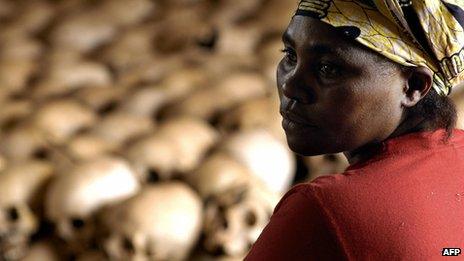Rwanda genocide: France to release suspect Serubuga
- Published

An estimated 800,000 people, mostly minority Tutsis, were killed in 1994
A French court has ordered the release of a former Rwandan colonel, wanted by the African nation for his alleged role in the 1994 genocide.
Rwanda had requested the extradition of Laurent Serubuga, a Hutu, who served as Rwanda's deputy army chief-of-staff.
The 77-year-old was arrested in July in northern France under an international arrest warrant issued by Rwanda.
An estimated 800,000 people, mostly minority Tutsis, were killed by the ethnic majority Hutus in 1994.
Mr Serubuga's son, Paulin, who was present at the tribunal said his family was relieved by the ruling.
"We were expecting a political trial. The lies of Rwanda have not been heard before the judges," he was quoted by AFP as saying.
'Classic case'
The court in Douai, France, found that at the time the atrocities were committed, genocide and crimes against humanity were not punishable by law in Rwanda, therefore Mr Serubuga could not be tried retroactively for crimes that were not part of the penal code.
French law does not grant extradition in cases where the defendant does not have fundamental guarantees that his rights will be protected, Mr Serubuga's lawyer, Thierry Massis, said.
"It's a pretty classic case," Mr Massis, told Reuters.
The lawyer representing Rwanda's interests, Gilles Paruelle, said he was not surprised by the decision as France had rejected several similar previous extradition requests.